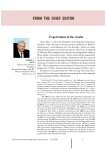Economic and Social Changes: Facts, Trends, Forecast @volnc-esc-en
Статьи журнала - Economic and Social Changes: Facts, Trends, Forecast
Все статьи: 1763
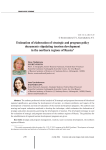
Статья научная
The authors performed critical analysis of 26 strategic and program documents of federal and regional significance, governing the development of tourism, to allocate problems and targets of the development of tourism and risks of realization of the tourism development programs. The authors used scoring and expert evaluation methods to develop the technique, which estimates the elaboration of strategic and policy documents governing the development of tourism. The developed technique is used for evaluation of strategic and program documents of the northern regions of Russia. The guidelines for the establishment of regional tourism development programs are given.
Бесплатно
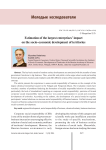
Estimation of the largest enterprises’ impact on the socio-economic development of territories
Статья научная
The key basic trends of modern society development are associated with the transfer of some government functions to big business. Thus, scientific and public circles argue about social partnership between government, business and employees and offer different variants of the corporate social responsibility concept. The article presents the experience to assess social responsibility of business on the example of the largest chemical enterprises located in the Vologda and Novgorod oblasts. The evaluation results have revealed a number of problems hindering the formation of socially responsible behavior of enterprises, particularly the lack of standardized reporting on corporate social responsibility; provision of formal corporate social responsibility report; business’ non-system participation in social and economic development of territories. According to the authors, the development of a special model to regulate participants’ mutual relations can increase social responsibility of Russian business. Unified interests and resources of business and government promote the development of an agreed strategy in the field of regional social-economic development.
Бесплатно
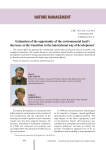
Статья научная
The article offers an approach for constituting various types of functions that tie economic and ecological indicators. The models based on such patterns should enable investigation of potential development scenarios in strategic planning and their comparative analysis. Calculation results based on Karelia data are presented for major types of functions offered.
Бесплатно
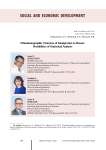
Ethnodemographic structure of immigration to Russia: possibilities of statistical analysis
Статья научная
Migration processes, unlike natural population movement, are more diverse, can be caused by different reasons and have different directions and deadlines. In this regard, the boundaries between the types of migration (and migrants) are often unclear, which complicates not only their classification, but also the choice of suitable sources for obtaining information about them. Ethnodemographic changes are taking place in modern Russia; this makes it necessary to monitor them more closely and expand approaches to their accounting. The purpose of the study is to develop proposals for the registration of immigrants based on the analysis of approaches developed in Russian and foreign practice aimed at studying and assessing the ethnodemographic characteristics of migrants. As a result of the study, we show that the most complete information about immigrants in Russia is provided by population census data, but the dynamic nature of migration flows requires additional measures related to their accounting. Current migration accounting is carried out using various forms, but the information most often remains at the level of authorized organizations and is not publicly available for analysis in the context of Russia’s regions and in the context of the countries whose citizens have arrived in Russia. Sample surveys allow us to study in more detail certain aspects of migration processes or certain categories of migrants, but their results may not always be comparable in time. We suggest the possibility of including additional data on the place of birth of the respondent’s father and mother in the population census sheets. For Russia, as well as for other countries, citizenship is an unstable feature, since migrants can become citizens of the country of residence. Requesting data on the place of birth of the respondent’s father and mother does not contradict constitutional law and helps to obtain a more clear idea concerning the ethnic and cultural roots of the individual.
Бесплатно
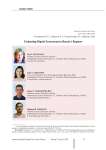
Evaluating digital ecosystems in Russia's regions
Статья научная
Successful establishment and functioning of the digital economy is possible only in an adequate digital ecosystem, but the semantic and structural content of this system has not been defined adequately yet. Such uncertainty can be found at different levels (federal, regional and local) and in various aspects: subject-related, branch, segment, technical and others. At the same time, the need to implement effective measures for the development of regional digital ecosystems requires not only an understanding of their qualitative content, but also an accurate quantitative assessment. Our paper analyzes conceptual approaches to the definition of a digital ecosystem, provides our own understanding of its full content, which allows us to build a sufficiently verifiable assessment of digital ecosystems development at the regional level. We present a technique for assessing the development of regional digital ecosystems; according to this technique two integrated indices are calculated, and on this basis we carry out an analysis on 82 constituent entities of Russia over the period of two years. The study reveals the existence of significant differentiation between the regions according to the level of development of digital ecosystems; it also helps identify a number of characteristic types of regions in this context. Our assessment has shown that, along with the majority of the regions where the development of digital ecosystems is defined as average, some regions show opposite trends. There are regions, for example, the Belgorod and Kirov oblasts, in which the conditions for the digital environment are below average, but the level of ecosystem development in them is average or higher. There are regions where the situation is the opposite, i.e. the conditions are quite high, but the level of development of the digital ecosystem as a whole leaves much to be desired. Such a negative example is the Moscow Oblast. We also identify leading regions and problem regions. We hope that a reliable assessment of development of digital ecosystems using our technique will help work out effective solutions for successful promotion of the digital economy in Russia.
Бесплатно
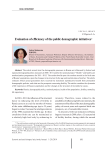
Evaluation of efficiency of the public demographic initiatives
Статья научная
The article reveals how the demographic processes in Russia are influenced by federal and regional demographic policy measures of 2006-2011 and by the national project “Health” and health care modernization programmes for 2011-2012. The author dwells upon the modern trends in the birth rate of Russia’s population, upon the changes in its structure by the age and marital status of mother. The article evaluates which actual generations have received the maximum reproductive benefit from pronatalist demographic policies, and what are the prospects concerning fertility. The article considers the dynamics of life expectancy of Russia’s population and the changes in the structure of mortality by causes.
Бесплатно
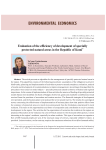
Статья научная
The article presents an algorithm for the management of specially protected natural areas in the region. This algorithm consists of the following procedures: assumption of the obligation to preserve biodiversity; planning and implementation of activities to preserve natural complexes; evaluation, analysis of results and development of recommendations to improve management. According to this algorithm the procedures were tested on model objects - specially protected natural territories of federal and regional importance. In the course of implementation of these activities the sources of funding of specially protected model objects were identified: the funds of budgets of all levels; grants and charitable contributions; funds received from the provision of recreation and tourism services. The financial strategies of development were provided, and the business plans were analysed for seven natural reserves. The results of a sociological survey concerning the effectiveness of implementation of business plans show that positive effects from the existence of protected areas are much more pronounced than the limitations experienced by local residents...
Бесплатно
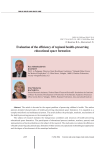
Evaluation of the efficiency of regional health-preserving educational space formation
Статья научная
The article is devoted to the urgent problem of preserving children’s health. The author presents detailed characteristics of health-preserving educational space formation. It is regarded as a complex multilevel and multispectral system. The article defines the principles, methods, mechanisms of the health-preserving process on the municipal level. The subject of research includes the background, conditions and resources of health-preserving educational space formation. The participants of educational process (students, teachers, parents) and representatives of local authorities are the object of the research. The study aims to evaluate the efficiency of health-preserving educational space formation within various conceptual and methodological approachesand the degree of involvement of the municipal authorities. In the course of the experiment the author tests the method of estimating the models of regional health-preserving educational space formation and healthy lifestyle training, developed by the author. The article pays considerable attention to the justification of choosing the optimal strategy within the implementation of health preserving technologies on municipal level. It shows the crucial role of constructive inter-agency cooperation between the education system, health care and the authorities for effective and productive activities in this sphere.
Бесплатно
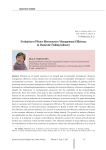
Evaluation of water bioresources management efficiency in domestic fishing industry
Статья научная
Efficient use of natural resources is an integral part of sustainable development. Resource management efficiency criteria should cover all components of sustainable development: economic, environmental and social. The purpose for the study is to assess the possibility of applying tools for measuring natural resources management efficiency in relation to water biological resources. The most developed are methodological approaches to assessing the economic efficiency of resource management. Despite the importance of environmental assessment and the availability of the methodological framework, there still remain some gaps in data availability for analyzing the impact of the fishing industry on the environment. The specific features of natural resources extraction and processing are particularly evident in indicators of environmental efficiency of resource saving. The paper substantiates the importance of taking into account emissions of water bioresources, unreported fishing, technological losses in assessing water bioresources management efficiency...
Бесплатно
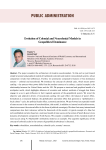
Evolution of colonial and neocolonial models in geopolitical dominance
Статья научная
The paper considers the architecture of modern neocolonialism. To this end we put forward simple structural and graphical models of traditional (colonial) and modern (neocolonial) systems, whose comparison reveals their differences. Further, we systematize comparative features of two dominance systems - colonial and neocolonial. We introduce the concept of colonial cycle, which means power castling - the process when power shifts from the mother country to its colony; a typical example is the relationship between the United States and the UK. We propose a structural and graphical model of a multipolar world, which highlights alliances of countries and indirect methods of struggle that States engage in so as to gain influence in their regional segments of the geopolitical system. We reveal the objective and subjective drivers of neocolonial castling: the scale effect; the balance of power effect, formalized as a structural balance; the globalization saturation effect that generates a “globalization / local culture” cycle; the political leader effect; economic patriotism. We put forward an expanded model of state success in the context of neocolonialism; this model, in addition to internal social achievements, takes into account the external effect in the form of political sovereignty. We show that many international comparisons lose their relevance within the framework of this model. A typical example of a false but well-established narrative based on a narrowed model of state success is the notion of South Korea's more dynamic development compared to North Korea. We consider a modification of the extended model of state success using N. Machiavelli's militaristic model as an example. The cognitive significance of the concept of colonial cycles in the context of geopolitical turbulence is discussed.
Бесплатно
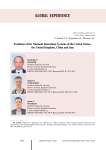
Статья научная
The concept of national innovation systems (NIS) involves consideration of the economic arrangements of individual countries. It is necessary to identify the features of institutions’ evolution that contribute to the processes of creating and transforming knowledge into new technologies and products. The article examines the experience of developing the NIS of the USA, the United Kingdom, China and Iran. The US and the UK have stable and developed NIS with a long history. Thus, Iran and China can be classified as countries with developing innovation systems but demonstrating considerable success. The significant difference between the considered innovation systems is how countries achieve political and economic sustainability. All of them are trying to stimulate market mechanisms for creating innovations. The Chinese innovation model combines the promotion of grassroots innovation and government support for technology enterprises. In the US and the UK, the leading role of business is associated with the perception that it is better at distributing investment in R&D than the Government. Iran is also trying to stimulate private innovation, but the Government still plays the key role because of the limited domestic market and sanctions restrictions. One of the prerequisites for the development of the NIS of Iran and China is a long-term policy in higher education, which, combined with population growth, has led to a significant expansion of access to higher education. The article is of interest to the Russian scientific community since the authors, on the one hand, explore the NIS of the leading countries in the field of innovation located on different continents (the UK, the US and China) and, on the other hand, a country that has been under sanctions pressure (Iran), which is especially important in the current economic and political realities. The authors suggest thinking about possible ways of developing the Russian innovation system by analyzing the foreign experience of the NIS. Scientists who are involved in researching NIS and national innovation policymakers can use the results of this scientific work.
Бесплатно
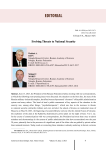
Evolving threats to national security
Статья научная
June 13, 2023, the President of the Russian Federation held a meeting with war correspondents, at which the following most pressing issues were discussed: the situation on the front line, the state of the Russian military-industrial complex, the effectiveness of personnel “elevators” of the public administration system and many others. The head of state’s public assessment of key aspects of the situation in the country was, among other things, “psychotherapeutic”, which was due to the increase in threats to national security, primarily military and even terrorist: the attack of drones on residential areas of Moscow on May 30, 2023, the beginning of counteroffensive on June 4 by the Armed Forces of Ukraine, the explosion of the dam at the Kakhovka hydroelectric power plant on the night of June 5 to 6, etc. In the course of communication with war correspondents, the President had more than once to admit mistakes and shortcomings in the system of public administration that have accumulated over the past 30 years, primarily due to the presence of a significant part of the elites who are guided by private rather than national interests. Today, work on correcting these mistakes is already underway in forced, extreme
Бесплатно
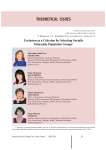
Exclusion as a criterion for selecting socially vulnerable population groups
Статья научная
The article considers theoretical aspects of a scientific research “The Mechanisms for Overcoming Mental Barriers of Inclusion of Socially Vulnerable Categories of the Population for the Purpose of Intensifying Modernization in the Regional Community” (RSF grant No. 16-18-00078). The authors analyze the essence of the category of “socially vulnerable groups” from the legal, economic and sociological perspectives. The paper shows that the economic approach that uses the criterion “the level of income and accumulated assets” when defining vulnerable population groups prevails in public administration practice. The legal field of the category based on the economic approach is defined by the concept of “the poor and socially unprotected categories of citizens”. With the help of the analysis of theoretical and methodological aspects of this issue, the authors show that these criteria are a necessary but not sufficient condition for classifying the population as being socially vulnerable...
Бесплатно
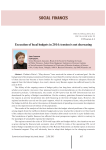
Execution of local budgets in 2014: tension is not decreasing
Статья научная
Vladimir Putin’s “May decrees” have received the status of a national goal. On the background of decreasing economic performance exacerbated by external shocks, the implementation of these decrees has become a heavy burden for regional budgets without an adequate financial support from the federal budget. As a result, almost every Russian region has suffered losses by the end of 2014. The fallacy of the ongoing course of budget policy has long been criticized by many leading scholars and experts; moreover, they proposed positive recommendations on the development of alternative policies. Unfortunately, the results of 2014 prove that the RF Government has not abandoned the policy of budget consolidation. On the contrary, gratuitous financial assistance to the regions is actively transformed into debt financing in the form of budget loans. However, the regional authorities can rely on this quasi-support, which is a temporary factor, only provided that the budget is deficit-free and at the expense of abandonment of spending on economic development and on the improvement of welfare of the population...
Бесплатно
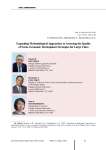
Статья научная
We substantiate areas of improving the tools designed to assess the quality of socio-economic development strategies for large cities. In particular, we developed and tested a methodology for assessing the quality of socio-economic development strategies for large cities based on the principles of strategic planning and social corporatism. At the first stage, it involves analyzing the dynamics of key indicators of socio-economic development in large cities, reflecting the growth rates of the number of city residents (“Citizens” indicator, provides a comprehensive assessment of the dynamics of development and targets of the urban community); the number of registered enterprises and organizations in the city (“Business” indicator, provides a comprehensive assessment of the dynamics of development and targets of the entrepreneurial community); the volume of housing construction (“Municipality” indicator, provides a comprehensive assessment of the effectiveness of municipal management through land use, interaction with residents and construction companies), as well as the faith of people and investors in the city and its future. At the second stage, we assess the use of five main mechanisms of social corporatism in the development strategies of large cities via contextual analysis: project management, urban sociology, territorial public self-government, municipal-private partnership, participatory budgeting. At each stage, we arrange large cities into groups in accordance with the criteria under consideration. At the final stage, we design a “Strategy - Development” matrix and put forward proposals for finalizing the strategies of large cities, taking into account their features. The approbation of the methodology has shown the heterogeneity of the quality of strategic planning and the dynamics of socio-economic development in Russia’s large cities. This may indicate that they are all at different stages of development of social corporatism. Therefore, it is necessary to use different approaches, tools and directions when developing city strategies, taking into account their characteristics and potential.
Бесплатно
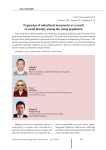
Expansion of subcultural movements as a result of social disunity among the young population
Статья научная
This article deals with the problem concerning the estrangement of Russian and Ukrainian society from the fundamental institutions of socialization. The acute issue of subcultural movements among the post-Soviet youth population is discussed as one of the negative consequences of this process. The article presents the main reasons for the spread of informal youth associations, as well as the mechanisms of subcultural attitudes’ influence on the younger generation. The basic directions of preventing the negative impact of subcultures are determined.
Бесплатно
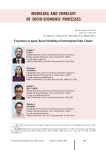
Experience in agent-based modeling of interregional value chains
Статья научная
Solving the problem of implementing powerful socio-economic breakthrough in Russia requires the formulation and implementation of the latest practices for the development of the corporate sector, civil society, and state institutions. In theory, these practices should be the product of some innovative activity in the management sphere. However, world experience shows that initiatives correlating with the current development paradigm and are its logical continuation can provide no less effective results. In particular, we are talking about the Russian policy of industrial diversification and import substitution. The country is definitely making progress in these areas, but it is too early to talk about confident results. Meanwhile, a reasonable and, most important solution of the issue, which is not contrary to the interests of the elite, has been in the focus of the scientific community for several years, this is the value chains. Handled properly, they can act as a driver for the development of territories, business, and the social sphere. The purpose of the research is the formulation and testing the tools for value chains modeling. In turn, the novelty of the tools lies in the possibility of taking into account the interregional factor of interaction and the availability of functionality for the implementation of variable calculations of the developing phenomena in the economy. The model peculiarity is provided by the synthesis of methods of intersectoral balance and agent-based modeling which, according to other research teams, provides greater accuracy and realism of modeling. In the course of the study, the authors analyze domestic and foreign experience in designing value chains, and present their characteristics in the regional context. The researchers represent a consequence assessment associated with stimulating consumer demand and the expected effect that can be caused by the value chains value chains development.
Бесплатно
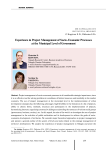
Experience in project management of socio-economic processes at the municipal level of government
Статья научная
Project management of socio-economic processes is of considerable strategic importance, since it is an effective tool for solving problems in conditions of limited resources and instability in the market economy. The use of project management at the municipal level in the implementation of urban development strategies has the following advantages: high flexibility in the formation of a list of projects; ability to choose forms, methods, resources and participants in the implementation of projects; harmonizing interests, organizing constructive dialogue and pooling the resources of various social groups (government, business, society), etc. In this regard, the aim of the work is to investigate the use of project management in the activities of public authorities and its development to achieve the goals of socio-economic development of territories. We consider major theoretical approaches to project management and present a general outline of the system of levels and tools related to the strategic management of territory’s development. We analyze the experience of project management in Vologda and prove the effectiveness of its use in the implementation of territory’s development strategy. In addition, we propose main directions for the application of advanced management technologies - the implementation of project management based on ESG principles. It includes addressing environmental issues (E - environmental), social responsibility (S - social) and personnel governance (G - governance). Analyzing theoretical foundations and Russian experience, we identify directions for the development of project management based on ESG principles, reveal current problems and propose a set of measures for further improvement of project work in the field of public administration in order to address strategic tasks of territorial development. The information base includes the works of Russian and foreign scientists, project management specialists, and data from official websites of Russia’s constituent entities. We use the following methods: analysis, comparison, generalization, sampling and grouping. The scientific provisions set out in the article may be useful to government officials and researchers interested in the implementation and application of project management.
Бесплатно
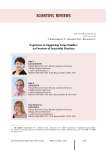
Experience in supporting large families: an overview of successful practices
Статья научная
A new protracted wave of depopulation in Russia, caused by birth rate decline and high mortality, poses serious risks to the labor potential, economic and social development of the country. In recent years, the government has been taking active measures to raise birth rate. Taking into account the fact that the growth potential of birth rate lies in an increase in the proportion of large families, it is necessary to update effective mechanisms for regulating the number of children in families. In this regard, it is interesting to study the tools for supporting families with children implemented by foreign governments in the context of the recorded population fertility dynamics. The aim of this study is to review government measures to stimulate fertility and support large families in countries around the world. The information was derived from electronic databases of Russian and international statistics, websites of foreign governments, and scientific literature on the research topic. In the course of the work we used general scientific and empirical research methods. The analysis showed that in most countries there are no measures to support large families as a special category, and demographic policy is limited to providing women with short-term paid maternity leave and monthly childcare benefits. Most of the aid goes to poor families. Some countries provide tax and pension benefits for large families, and childcare allowances that increase with the birth of a subsequent child. The demographic and family policy being implemented in Russia is focused to a greater extent on families with children, including those with many children, which has the status of state priority. The following formats of support for families with children are of practical interest from the point of view of potential application in Russia: Polish programs “500+”, “Big family card”, “Mother 4+”; programs implemented in some oil and gas exporting countries: “Marriage bonus (loan)”, allocation of housing to a young family, opening an account for a newborn and its regular replenishment, tuition fees; “maternity leave” for men and the opportunity to use parental leave for eight years in the Nordic countries; partial or full compensation for babysitting services, including for close relatives caring for a child; payment for preschool educational institutions, vacation clubs, etc. in a number of European countries. Practical significance of the work lies in the possibility of taking into account international experience in the development of federal and regional programs to support potential and actual families with many children
Бесплатно

